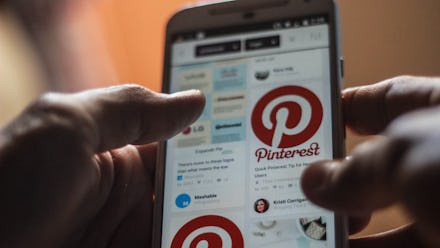Pinterest is ousting anti-vaxxers. Will other platforms soon do the same?

In a fight against the spread of health misinformation, Pinterest will now limit vaccine-related search results to authoritative sources. This update will show Pinterest users research-driven information provided by leading public health organizations such as the World Health Organization (WHO), the Centers for Disease Control and Prevention (CDC), and the American Academy of Pediatrics (AAP). The new search will also block recommendations, comments, and advertisements on any Pins that appear in the results.
The latest change to the platform comes a year after Pinterest completely removed vaccine-related search results to prevent anti-vaccine conspiracies from spreading. It's part of the company's efforts to become a positive source of inspiration and motivation for its 300 million users. Last month, Pinterest also collaborated with mental health experts to include stress management tools in the Pinterest app to help people with social media anxiety or work stress.
Many social network companies, like Facebook and Twitter, have struggled with removing harmful anti-vaccination groups from their sites. The enormous amount of users on each platform requires an equally enormous amount of attention and employees to manage. Search algorithms that were meant to help users have also become double-edged swords that spread conspiracies even further. YouTube's search algorithm famously buried informative vaccination videos under anti-vaccination results, even when someone is trying to search for authoritative and science-backed information about vaccines.
This is a problem that has been building for at least a decade, according to NBC News. YouTube told the publication that tackling the issue was "a difficult challenge" that would take a long time to address. But Pinterest isn't waiting. It's going a step further by completely altering its search results.
"We’re taking this approach because we believe that showing vaccine misinformation alongside resources from public health experts isn't responsible," the company said in a statement. "Health misinformation has the potential to impact public health, regardless of what service it’s found on. Allowing this content to spread through Pinterest’s search results is not in line with enforcing our community guidelines."
Anti-vaccination groups, known as 'anti-vaxxers,' have taken advantage of social media to spread harmful health misinformation through online support groups and advertisements. These often end up misleading vulnerable users — particularly young, new parents. It's become such a global problem that the WHO has listed 'vaccine hesitancy' as one of the top ten threats to global health in 2019.
According to the WHO, vaccines have prevented 2-3 million deaths a year. Yet there's a worldwide increase in cases involving preventable diseases. For example, measles cases have increased globally by 30 percent since 2017. The WHO noted that "some countries that were close to eliminating the disease have seen a resurgence."
Today, the WHO has declared that four countries in the EU have lost their 'measles-eradicated' status due to the wave of outbreaks that occurred in the past year. The United States is also less than a month away from also having its measles-free status removed.
Measles is a highly contagious viral infection that's easily prevented by vaccines. Some people may not realize that contracting measles can be very serious for children; there are kids who have died from prolonged symptoms or developed complications such as encephalitis.
Ifeoma Ozoma, Pinterest's public policy and social impact manager, wrote that the company noticed an "enthusiasm gap" between people creating and spreading harmful misinformation and people who make resources "rooted in settled science."
"Generally, there’s more accessible and visually compelling health misinformation than science-based journal articles on the virtues of vaccinations," wrote Ozoma. Pinterest also noticed that the people spreading misinformation seemed to have a financial reason behind their actions.
"For instance, some sell products and potions, and others use spammer tactics and clickbait to drive traffic to their own sites where they monetize."
Providing authoritative information about vaccines in search results is just the beginning for Pinterest.
"We’re starting with vaccinations because the WHO determined that vaccine hesitancy is a significant threat to everyone," said Ozoma. "We’ll need to keep evolving our list of terms for which we block medical misinformation and provide expert advice as people try to get around our safeguards. We’ll also continue to remove this content and accounts that spread it from our service."
The new Pinterest search update is available now, in English, for app and desktop users. The company plans to release versions of the search in other languages in the future, and promises to continue working with global health experts to provide accurate information about other health topics to its users.